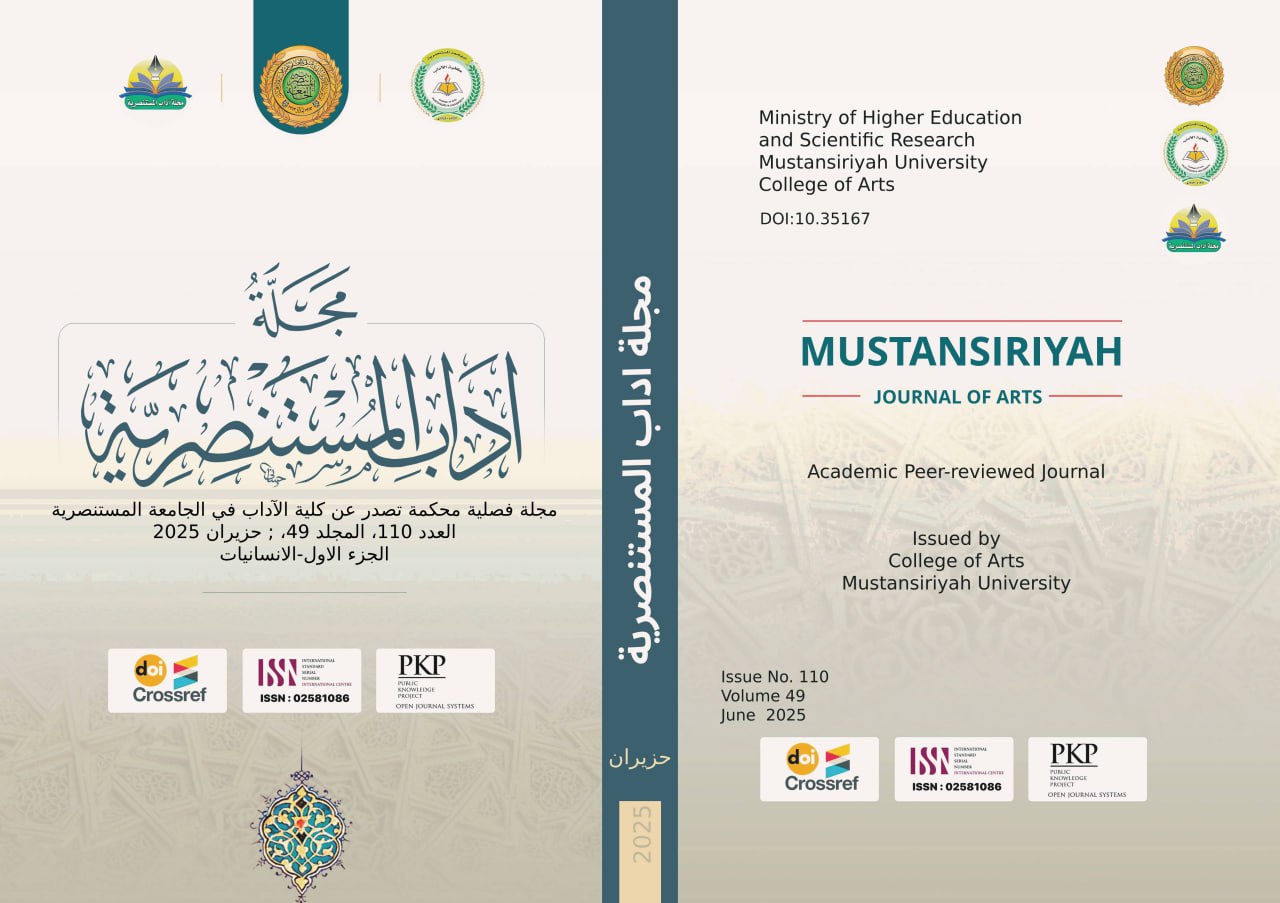Abstract
The Andalusian poet Yahya ibn Hakam al-Jiyani, famous for al-Ghazal, who died (250 AH), one of the poets whose collections were lost after collection, and no one is able to address the investigation of his collection except a small amount of finding that is scattered in the sources, and" what was lost from his poetry is more than what remained of it, and what was missing of his news is more than what has come to us".
However, what remains of his poetry, despite its scarcity, shows us a different poet in his life and the poetic doctrine, and perhaps he was - in his personality and poetry, the best who represents the life of the Andalusians at the end of the second century and the first half of the third century AH, and it is not a coincidence that the Umayyads elected him to be an ambassador of Andalusia in important European countries and in Constantinople, but because of the apparent and diplomatic features in his personality that qualified him to advance this civilized task.
Therefore, the researchers try, by contemplating the remainder of his poetry, to highlight the features of this distinguished literary figure in transcending the familiar framework of movement and expressing the Andalusian civilizational aspect, based on his cultural formation, his love for travel, his diplomatic communication ability, and his understanding of cultural images and the various horizons of social life.
The poet showed all this through his poetic art, which is characterized by the realism of expression, ease, staying away from artificiality and embellishment, and the tendency to social criticism, with quite a few successful philosophical views and emotional honesty.
After that, the specificity of Ghazal's poetry is evident in its language and methods of a civilized nature, which were seen through its purposes and meanings, as we found it centered around a basic foundation that took the form of the phenomenon that we call the civilizational effect in his poetry.
However, what remains of his poetry, despite its scarcity, shows us a different poet in his life and the poetic doctrine, and perhaps he was - in his personality and poetry, the best who represents the life of the Andalusians at the end of the second century and the first half of the third century AH, and it is not a coincidence that the Umayyads elected him to be an ambassador of Andalusia in important European countries and in Constantinople, but because of the apparent and diplomatic features in his personality that qualified him to advance this civilized task.
Therefore, the researchers try, by contemplating the remainder of his poetry, to highlight the features of this distinguished literary figure in transcending the familiar framework of movement and expressing the Andalusian civilizational aspect, based on his cultural formation, his love for travel, his diplomatic communication ability, and his understanding of cultural images and the various horizons of social life.
The poet showed all this through his poetic art, which is characterized by the realism of expression, ease, staying away from artificiality and embellishment, and the tendency to social criticism, with quite a few successful philosophical views and emotional honesty.
After that, the specificity of Ghazal's poetry is evident in its language and methods of a civilized nature, which were seen through its purposes and meanings, as we found it centered around a basic foundation that took the form of the phenomenon that we call the civilizational effect in his poetry.
Keywords
Andalusian.
Civilization
effect
poetry
Yahya al-Ghazal
Abstract
الشاعر الأندلسُي يحيى بن حكم الجيّاني المشهور بالغزال، المتوفى (250 هـ) من الشعراء الذين فُقِدتْ دواوينهم بعد جمعها، ولم يتمكنْ مَنْ تصدّى لتحقيق ديوانه إلّا على العثور على النزر اليسير مما تناثر في المصادر "وما ضاع من شعره أكثر مما بقي منه، وغابَ عنّا من أخباره أكثر مما وصلَ إلينا ".
بيَد أنّ ما تبقّى من شعره، وعلى الرُّغم من قلته، يظهرهُ لنا شاعراً مختلفاً في حياته ومذهبه، الشعري، ولعله كان- في شخصيته وشعره، خيرَ منْ يمثل حياة الأندلسيين في نهاية القرن الثاني والنصف الأول من القرن الثالث الهجري, وليس مصادفة أن يقع اختيار الأمويين عليه ليكونَ سفيرًا لبلاد الأندلس في بلدان أوروبية مهمة وفي القسطنطينية، بل لما توافر في شخصيته من سمات ظاهرية ودبلوماسية أهّلتهُ للنهوض بهذه المهمة الحضارية.
لذا حاول الباحثان, عبر تأمُّل ما تبقّى من شعره أن يُبرزا معالم هذه الشخصية الأدبية المائزة في تجاوزها الإطار المألوف في الحركة والتعبير عن الجانب الحضاري الأندلسي مستندين إلى تكوينه الثقافي ,وحبّه للأسفار, والقدرة التواصلية الدبلوماسية ,واستيعاب ذاكرته للصور الحضارية ,وآفاق الحياة الاجتماعية المختلفة.
وقد أظهر الشاعر كلَّ ذلك, عبر فنه الشعري المتسم بواقعية التعبير والسهولة, والبعد عن الصناعة والتزويق, والميل إلى النقد الاجتماعي, مع غير قليل من النظرات الفلسفية والصدق الوجداني.
وبعدُ: فإنَّ خصوصية شعر الغزال تتجلّى في لغته وأساليبه ذات الطابع الحضاري التي تراءت عبر أغراضه ومعانيه, اذ وجدناها متمحورةً حول مرتكز أساسي أخذ شكل الظاهرة التي اسميناها الأثر الحضاري في شعره.
بيَد أنّ ما تبقّى من شعره، وعلى الرُّغم من قلته، يظهرهُ لنا شاعراً مختلفاً في حياته ومذهبه، الشعري، ولعله كان- في شخصيته وشعره، خيرَ منْ يمثل حياة الأندلسيين في نهاية القرن الثاني والنصف الأول من القرن الثالث الهجري, وليس مصادفة أن يقع اختيار الأمويين عليه ليكونَ سفيرًا لبلاد الأندلس في بلدان أوروبية مهمة وفي القسطنطينية، بل لما توافر في شخصيته من سمات ظاهرية ودبلوماسية أهّلتهُ للنهوض بهذه المهمة الحضارية.
لذا حاول الباحثان, عبر تأمُّل ما تبقّى من شعره أن يُبرزا معالم هذه الشخصية الأدبية المائزة في تجاوزها الإطار المألوف في الحركة والتعبير عن الجانب الحضاري الأندلسي مستندين إلى تكوينه الثقافي ,وحبّه للأسفار, والقدرة التواصلية الدبلوماسية ,واستيعاب ذاكرته للصور الحضارية ,وآفاق الحياة الاجتماعية المختلفة.
وقد أظهر الشاعر كلَّ ذلك, عبر فنه الشعري المتسم بواقعية التعبير والسهولة, والبعد عن الصناعة والتزويق, والميل إلى النقد الاجتماعي, مع غير قليل من النظرات الفلسفية والصدق الوجداني.
وبعدُ: فإنَّ خصوصية شعر الغزال تتجلّى في لغته وأساليبه ذات الطابع الحضاري التي تراءت عبر أغراضه ومعانيه, اذ وجدناها متمحورةً حول مرتكز أساسي أخذ شكل الظاهرة التي اسميناها الأثر الحضاري في شعره.
Keywords
الأثر الحضاري، غزل، يحيى الغزال، الشعر الاندلسي.
